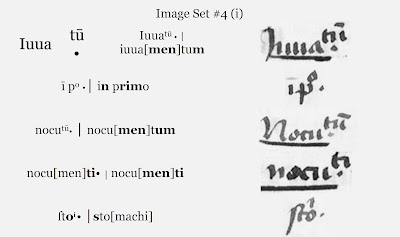Image Set #4
[i] Abbreviation by superscript letters
can simply indicate the ending of the word; we use superscript in ordinal
numbers e.g. 1st 2nd but is used far more widely in the
manuscripts:
ī po│ in
p[rim]o
iuuatū │ iuua[men]tum
nocutū
│ nocu[men]tum
nocuti │
nocu[men]ti
ſtoi•│sto[machi]; in another section of the
manuscript he writes the same superscript i alone for nocumenti i.e. noci• with identical formation of i
[ii] superscript
i: above q, it denotes the superscript letter itself and the
vowel u.
Qid │ quid
[iii] superscript
bȝ: [ȝ] this sign is
very often used to represent the dative and ablative plural endings of the
third, fourth and fifth declension i.e. bus
ī regiobȝ │ in regio[ni]bus
As mentioned
above, scribes do not always adhere to the rules; the same /bȝ/ is also
found in the manuscript but not as superscript, and, elsewhere, it can have
different meanings.
ſeībȝ │ se[n]ibus
[iv] As we still
do today, a dot (period) can be placed after the word to indicate truncation.
In this manuscript, the writer places most of these below the superscript
letters.
Image Set #5
[v] Classical
Latin had no /v/ sound as in very; in inscriptions V = u (CIRCVS MAXIMVS
[kirkoos maksimoos]
The sound can be:
[1] as a separate
vowel either short or long (the latter in edited texts marked by a macron: ū):
sum, tū
[2] as a
semi-vocalic sound similar to English w before another vowel: uideō
[wideo], amāuī [amawi]
Ecclesiastical
Latin distinguishes these
two both in writing and in pronunciation, the semi-vocalic of [2]
being pronounced as Modern English v i.e. [1] sum [soom]; [2] videō [video]
In most edited
texts (including textbooks) for Classical Latin that distinction is
maintained in writing i.e. sum / videō, but the original
pronunciation of [2] as w is retained. Some textbooks, however, e.g. Jones
and Sidwell’s Reading Latin, retain u for both.
In the manuscript
there is no distinction in:
Iuuatū • │ Iuua-; cōuēiūt │ conueniunt
Using our most
common means of distinguishing between these two iuvamentum and conveniunt
would appear in a dictionary or textbook, but the scribe did not distinguish
them and the transcription should reflect what he wrote. He does, however,
write v at the beginning of vere.
This variation of
/v/ and /u/ is evident in the first folio of Shakespeare’s works (1623), the initial
letter of the word regardless written as /v/, in all other instances written as
/u/ regardless of pronunciation.
From Macbeth
(Act I, scenes 1 and 2):
[i] Valours;
Victorie; Villainies: reflect the pronunciation of /v/, but:
the Victorie
felt on vs [us]
Vpon the Heath; vpon the Foe [upon]
to our generall vse
[use]
[ii] Below are
examples where /u/ represents both sounds:
thunder / houer
through the fog and filthy air [hover]
I must
report / ouer-charg’d [over]
braue [brave];
deſerues [deserves]; lauiſ [lavish];
leaue [leave]; Reuolt [revolt];
A bit of “gentle”
Shakespeare shows both these letters in action:
“Till he vnseam’d
[unseamed] him from the Naue [Nave] toth’
Chops, And fix’d his head vpon [upon] our Battlements” │ Until
he split him from belly to jaw and stuck his head upon our castle walls.
Image Set #6
Look out for the long
s: ſ, not to be confused with f:
ſic │ sic[cis]
ſunt │ sunt
ſeībȝ │ se[n]ib[u]s
Both the long s
and the ‘round’ s we have now are used in the manuscripts. You can learn
the “rules” from a vegetable. Long s is not used:
[i] for upper
case letters: Sparagus (but small case ſunt)
[ii] at the end of
the word: Sparagus, ſūmitates │ su[m]mitates
It needs to be emphasised that, despite there being common abbreviations which can be identified by “a few simple rules”, there are some very peculiar forms with meanings that are not always consistent. Below is my attempt to transcribe this text using the abbreviations as they are used in the manuscript; I can’t vouch 100% for its accuracy but the group is entitled “Latin for Learners” – and I’m learning about this too! Any comments or amendments are welcome.
Sparagus Complc̄ cal + hm¯
ī po• Elec̄ recentes cuiꝰ ſūmitates declināt ad terrā Iuuatū • addūt in coitu, et
aperiūt opilatioēs¯ Nocutū • nocēt uillis ſtoi• Remō nocuti • poſtꝗ̃ eliſati
ſunt comedātur cū muri aut aceto Quid gnant nutrimentū
bonū Cōuēiūt frīs et ſic ſeībȝ +
decrepitis in vere et ī regiobȝ • in quibus reꝑiūtur.






No comments:
Post a Comment